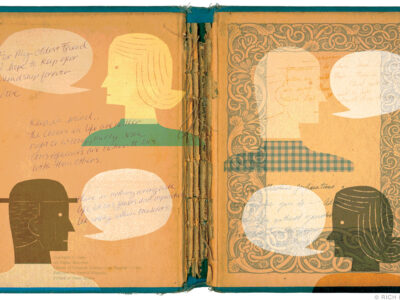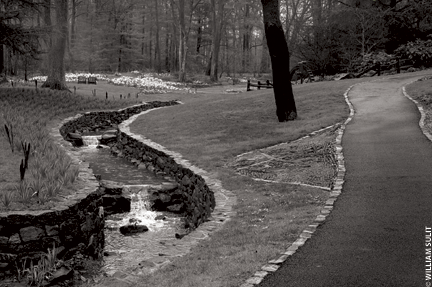
“This is a book about land, and about how land, like us, changes over time.” An excerpt from Ghosts in the Garden.
By Beth Kephart | Photography by Wiilliam Sulit
Memoirist Beth Kephart C’82 has addressed motherhood (A Slant of Sun), friendship (Into the Tangle of Friendship), marriage (Still Love in Strange Places), and the imagination (Seeing Past Z) in her previous books. Ghosts in the Garden: Reflections on Endings, Beginnings, and the Unearthing of Self, published in March by New World Publishing, examines middle age and the changes that time makes in lives and nature through the prism of the passing seasons at Chanticleer Gardens in southeastern Pennsylvania.
Covering the two years following her 41st birthday, the narrative weaves together Kephart’s own story—her relationship with her now-adolescent son Jeremy and her husband Bill (whose photographs accompany the text), her thoughts about her work as a writer—with vivid descriptions of the things she sees and the people she meets on repeated visits to the garden. She also sketches the place’s history from the time it was home to the Lenni Lenape tribe through its years as a working farm and private estate to its development as a public pleasure garden on Philadelphia’s Main Line. “This is a book about land and about how land, like us, changes over time,” Kephart writes. “It is a book about our need to preserve the things we love, and our need to let them go.”
Ghosts in the Garden is moving, thoughtful, honest; both sad and somehow uplifting. We’re very pleased to offer the following excerpt. —J.P.
Held in Suspense
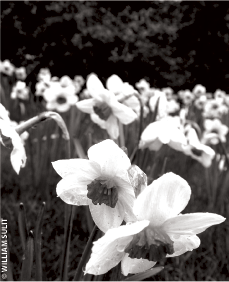
That first day of April, when I went to Chanticleer, the promise of the garden was held mostly in suspense. There were the unburst buds of old magnolia trees and the tentative arrival of jack-in-the-pulpits in the woods. The daffodils had raised their shoulders on the hills, the cherry trees were almost pink, and there was a tincture of crocus purple in the grass. But mostly the message was: Wait and see; watch me. Like a memory just vaguely coming into view or the mist of a dream upon awakening, the garden in early April was all suggestion and seduction.
The beauty of a garden will be revealed in time. I walked the macadam path. Stood on the bridge. Crouched near the stream. Listened to the murmuring around me: wings, women, water. What next? I asked myself. What next? I was forty-one. My son was no longer a little boy, but an adolescent with his own thoughts and agenda. I had been with my husband for nearly 20 years; how we loved and what we loved seemed entirely familiar. The work I strive to do didn’t give me pleasure anymore, and I was going nowhere, in a muddle in my mind. Can you find your purpose on a declivitous hill? Can you see beyond that turn, toward what’s next? At points in the garden the path diverged. Go this way. Go that way. It was up to me to choose.
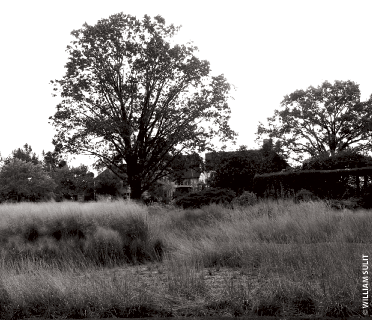
The Season We Were In
I took my son to the garden that first season. We were hardly through the gate before he took off down the path and flew. “See you, Mom,” he said, and he was running, as if the garden was a racetrack and some crowd was circled round and roaring. He had big feet already, and I could hear them pounding, pounding, pounding, turning the corner, disappearing. He must have thought Chanticleer was so much larger than it is. He must have thought he needed speed and wings to see it.
I trailed behind him at a mother’s pace. Some of the flowers still kept secrets, hiding their buds behind leaves, not letting on. The hydrangeas were in full force, though, and the bromeliads were happy among the other tropicals, and the trees were abundantly green and sweet, standing there like umbrellas to shield us from the sun. Everyone I passed was looking up at the trees or reaching out to touch the most vulnerable parts of them. I don’t remember there being much talk, but I do remember mothers with daughters, and daughters with mothers, of almost every age.
Up ahead of me and then behind me, my son ran—the sound of his shoes announcing his arrival. “Hey, Mom,” he said, and then he was by me again, sprinting past, while I was only just turning the corner of the pond and heading across the bridge toward the Asian Woods, where everything was green and dark, almost (you could kid yourself) primordial. Through the woods and up the hill, toward the original estate, with its formal, terraced garden and its roofed-over but open-to-the-breezes porch. You could tell it was going to be a big season for hydrangea and that the peonies would soon have plenty to say. You could tell a lot, or you could anticipate; such was the season we were in.
My son was threatening to run another lap around me, but this time he stopped and walked beside me. Just slowed down, so that now in the garden there was this mother and her son, not talking much, just looking up, mostly at the trees. He was breathing hard, and I was not. He was my height, since I wore shoes with tall heels. And if neither of us knew the names of things, we weren’t pretending to. I was 29 when he was born, and this was 12 years later. My face had changed, and my body had too, and I already understood that we were ghosts just passing through. But I didn’t let on. I would not say, Right now will be a memory soon.
Later, during subsequent visits, he would go off the path, cross over the stream, find me again, then disappear. He would set off like some kind of spy on some kind of mission, then return with the news of his adventures. There was a woodshed in the Asian Woods. Had I seen it? No. There was an alley between the grasses that was full of bumps; he’ d found it. There was a leopard-patterned chair, where he had stopped to sit, and why were his feet wet? Because he’d walked across the stream. Across it? Through it. It’s not that deep. It’s shallow.
He saw the jerseys of his favorite soccer team in the bed of orange flowers; this is what he said. He saw the lists of plants that the gardeners left in boxes as clues to an urgent mystery. It was all a game to him, his own private game, though we had come together and we would leave together—not often, but sometimes. He was tall, slim, dear, this son of mine. I walked behind him, listened to him, looked for him in the shaded places. He was turning the garden into his own narrative, even as I had begun to work it into mine.
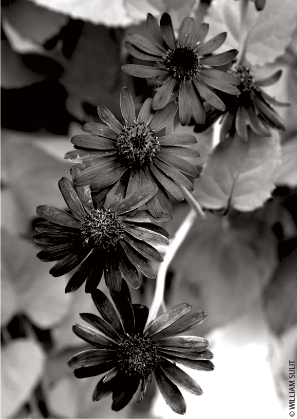
Riding the Breeze
Seeds will ride the breeze. They will travel in the belly of a bird or float across the sea. Stay stowed away in a nest of leaves until a big wind blows, or be carried off then shaken loose from the pelt of a fox or hare. Friends send seeds and gardeners hunt them, and they are dust or they are huge, and they want the prick of a sharp knife, or they flinch from it. They will lie dormant all through winter, stay suspended in a paper sleeve, appear not to breathe in a sealed glass jar, but give seeds oxygen, moisture, the right temperature, light, and they won’t be seeds anymore. They’ll be what the genes have programmed them to be—roots wriggling out into the ground, other parts reaching for the sun, morphing into stigma and stamen, erupting, shamelessly, with petals.
Whether you are on the path or off it at Chanticleer, it’s hard to accept the wholly unlikely fact that, for eons, nothing bloomed at all; there were no flowers. No public erotica, few paint-box colors, no anthers flecking off their grains of life.
The world had to wait for the dinosaur to exit stage left before it got the gift of flowers (so naturalist Loren Eiseley tells us), and flowers were self-serving from the start: Come take me, touch me, smell me, eat me, take my future with you. Self-serving but at the same time selfless too—the flower needs to give up its fruit to survive another season.
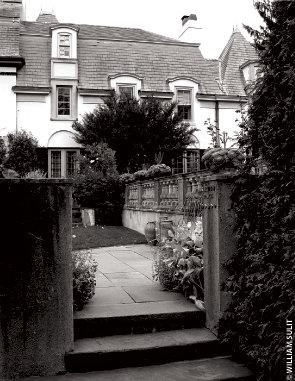
Another Way of Seeing
Place can superimpose its intelligence over ours if we relinquish and give in. Place can shift perspective. The questions start to change. The values do. The hues. There is another way of seeing, always. You have to open to it.
Week after week I went to Chanticleer, mostly alone. I’d take an apple with me, eat it. I’d smooth out a seat on the grass and watch grass grow. I’d take a book and press open a page and then leave it to the sun. I’d sit in a swarm of butterflies until they’d forget I was there, and I would try to catch the scent of things and give them similes. This one smells like licorice. This one could be Kool-Aid. This one could be my mother’s dress, hung up on the line to dry.
And some would say that I accomplished nothing, but I would say, looking back, that the opposite is true. I would say that I was learning to trust what I could not set in language, keep, control, or hold. I would say that I was learning to surrender. To stop warring with myself, to stop needing to be right, to come to terms with shifts and change, to sit on a hill and count my blessings.
And I would say as well that by the time September came and October edged toward November, I had come to understand that at Chanticleer they are not afraid to let things die. By the stream the once-tall ferns became a flattened molten brown, and that’s all they were—exhausted and unashamed. In the pond the lilies lost their pink but glowed. In the vegetable garden the gourds grew overheavy for their vines and sagged. And elsewhere the cornstalks singed, while the reds yielded to yellows, while the leaves on the crabapple trees took off, leaving nothing but the berries. Fewer birds were in the trees, less song, and the bees began to cluster in odd places. Fewer people were passing through, and those who were there when I was spent less time looking for their faces in the mirror of the pond.
The gardeners, though — the gardeners worked their gardens. Tamped things down, harvested seeds, drew blankets over that which needed blankets. The gardeners went about doing what gardeners do. Respectful of the season.
“All changes, even the most longed for, have their melancholy,” novelist Anatole France once wrote, “for what we leave behind us is a part of ourselves; we must die to one life before we can enter another.”
The Part of You That Loves Them
The day I took my husband to the garden it was hands-in-pockets weather. On the hill past the ruins, one of the gardeners was pulling last night’s blankets from big ballooning flowers. On another hill, the limbs of crabapple trees were rimmed with bright red berries. By the terrace, the deeply dimensional passionflowers bloomed. All about, the leaves of the hydrangea were maroon.
They were letting things die at Chanticleer; such was the season. The skies were bright blue, but the air was cold, impatient, and my husband with his camera and I with my notebook were wishing we’d brought gloves. We walked together, side by side, and then we separated. I lost sight of him at the sorghum and wended my way down toward the woods.
There were few others about, owing to the wind, the cold, the season, and I wondered, as I walked alone, whether my husband would locate the garden’s beauty. It was October, after all, and if you didn’t know all the colors and all the songs that the garden had bloomed forth with, you might not be able to imagine or to gauge all that I’d come to need. I had told him and told him and told him about the garden, but my husband was walking in it now. Can you give away the things you love, or the part of you that loves them?
It was cold, and maybe it wasn’t just the winds that were impatient. I hurried my pace and began to hunt for the man with whom I had arrived, the man with whom I’ve been for almost 20 years. It wasn’t long before I found him (it never is at Chanticleer), but at first I kept my distance. For there he was, up on the terrace, appraising a passionflower with his camera. Stepping closer, stepping back, looking at it now from a new angle, and though he must have been cold (for it was very, very cold), he seemed content inside the picture. Happy to be where he was, happy to look at what I loved, happy to take my hand when at last I called his name.
We left the garden shortly after that and came back home, to seeds.
From the book Ghosts in the Garden. Copyright © 2005 by Beth Kephart. Photographs copyright © 2005 by William Sulit. Reprinted with permission of New World Library, Novato, California. For information or to order, visit www.newworldlibrary.com or call 800-972-6657, ext. 52.



